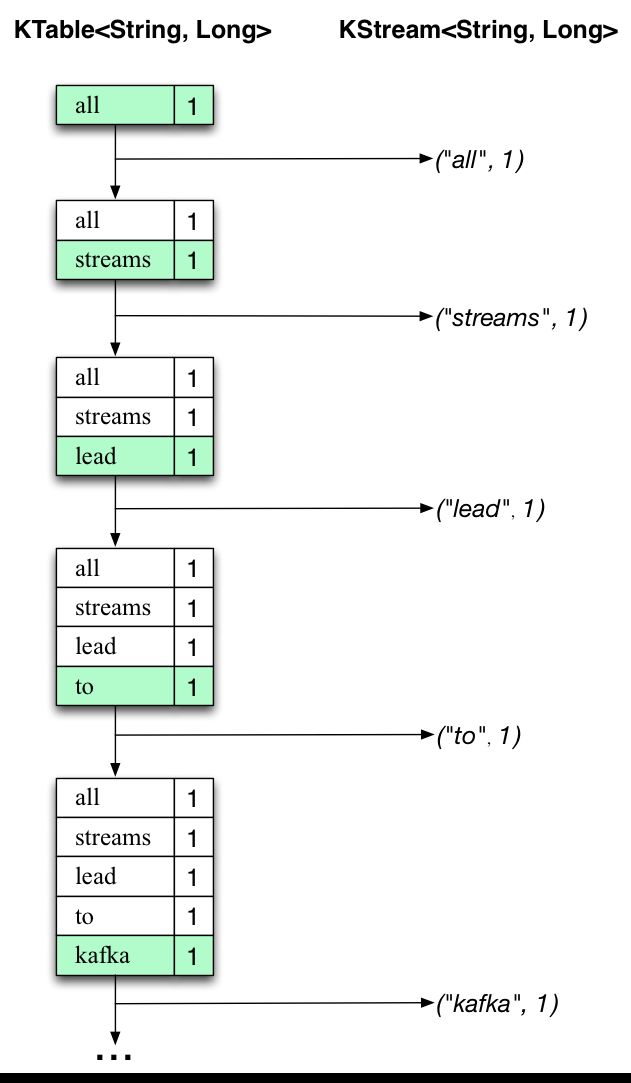初探 Kafka Streams 之一:运行 Kafka Streams 示例程序
kafka Streams 是一个客户端库,使用存储在 Kafka 集群中的数据作为输入、输出,用于构建任务关键的实时应用和微服务。在客户端侧,Kafka Streams 结合编写和部署标准 Java 和 Scala 应用的简易性与 Kafka 服务端集群技术的优势,使这些应用具有高度的可伸缩性、弹性、容错性、分布式等优点。
下面使用 WordCountDemo 作为示例代码,演示如何使用 Kafka Streams 库运行一个流式应用。WordCountDemo 示例代码的要点(转换为使用 Java 8 lambda 表达式以便阅读):
// Serializers/deserializers (serde) for String and Long types
final Serde<String> stringSerde = Serdes.String();
final Serde<Long> longSerde = Serdes.Long();
// Construct a `KStream` from the input topic "streams-plaintext-input", where message values
// represent lines of text (for the sake of this example, we ignore whatever may be stored
// in the message keys).
KStream<String, String> textLines = builder.stream(
"streams-plaintext-input",
Consumed.with(stringSerde, stringSerde)
);
KTable<String, Long> wordCounts = textLines
// Split each text line, by whitespace, into words.
.flatMapValues(value -> Arrays.asList(value.toLowerCase().split("\\W+")))
// Group the text words as message keys
.groupBy((key, value) -> value)
// Count the occurrences of each word (message key).
.count();
// Store the running counts as a changelog stream to the output topic.
wordCounts.toStream().to("streams-wordcount-output", Produced.with(Serdes.String(), Serdes.Long()));
一、下载与安装 Kafka
kafka_2.12-2.5.0 下载地址:https://www.apache.org/dyn/closer.cgi?path=/kafka/2.5.0/kafka_2.12-2.5.0.tgz
tar -xzvf kafka_2.12-2.5.0.tgz
cd kafka_2.12-2.5.0/
二、启动 Kafka 服务器
由于 Kafka 使用了 ZooKeeper,需要先启动 ZooKeeper 服务器。Kafka 自带了一个单节点的 ZooKeeper,可以使用脚本启动它:
bin/zookeeper-server-start.sh config/zookeeper.properties
启动 Kafka 服务器:
bin/kafka-server-start.sh config/server.properties
三、准备输入主题和启动 Kafka 生产者
创建输入主题:streams-plaintext-input
bin/kafka-topics.sh --create \
--bootstrap-server localhost:9092 \
--replication-factor 1 \
--partitions 1 \
--topic streams-plaintext-input
由于输出流是一个 changelog 流,启用压缩,创建输出主题:streams-wordcount-output
bin/kafka-topics.sh --create \
--bootstrap-server localhost:9092 \
--replication-factor 1 \
--partitions 1 \
--topic streams-wordcount-output \
--config cleanup.policy=compact
使用 kafka-topics 工具,查看已创建主题的描述:
bin/kafka-topics.sh --bootstrap-server localhost:9092 --describe
四、启动 Wordcount 应用程序
示例程序将从输入主题 streams-plaintext-input 中读取消息,在执行 WordCount 算法计算之后,将结果连续写入输出主题 streams-wordcount-output,因此除日志项之外,不会有任何 STDOUT 输出。
bin/kafka-run-class.sh org.apache.kafka.streams.examples.wordcount.WordCountDemo
启动控制台生产者,向输入主题中写入数据:
bin/kafka-console-producer.sh --bootstrap-server localhost:9092 --topic streams-plaintext-input
使用控制台消费者,从输出主题中读取结果:
bin/kafka-console-consumer.sh --bootstrap-server localhost:9092 \
--topic streams-wordcount-output \
--from-beginning \
--formatter kafka.tools.DefaultMessageFormatter \
--property print.key=true \
--property print.value=true \
--property key.deserializer=org.apache.kafka.common.serialization.StringDeserializer \
--property value.deserializer=org.apache.kafka.common.serialization.LongDeserializer
第一列是 Kafka 消息的键,格式为 java.lang.String,代表被计数的词; 第二列为消息的值,格式为 java.lang.Long,代表词的个数。
五、处理数据
使用控制台生产者,向输入主题 streams-plaintext-input 写入一些消息,键入一行文本,并以 RETURN 结束。这将向输入主题发送一条消息,其中消息键为空,消息值为键入的字符串编码文本行(实际上,应用程序的输入数据通常将连续地流入到 Kafka 中)。
键入:all streams lead to kafka
继续键入:hello kafka streams
再键入:join kafka summit
下面的两个图表说明了在该场景中幕后发生的事情。Kafka Streams 在这里所做的是利用表和 changelog 流之间的二元性(table = KTable, changelog stream = the downstream KStream):可以将表的每个更改发布到一个流,如果从头到尾使用整个 changelog 流,则可以重建表的内容。
六、停止应用
通过 Ctrl-C 按顺序停止控制台消费者、控制台生产者、Wordcount 应用程序、Kafka 代理、ZooKeeper 服务器。
七、参考资料
[1] Run Kafka Streams Demo Application








